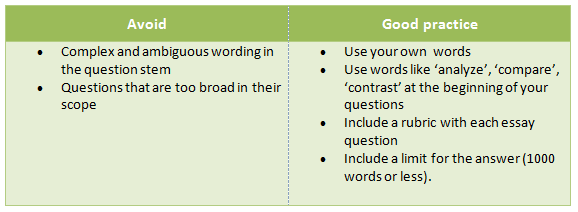Types of Questions
Short Answer
Short answer questions require a written answer that varies in length from one or two words to a few sentences. They are most often used to test basic knowledge of key facts and terms.

Example
“What is the type of question that requires students to associate a set of prompts with a set of options?”
Answer: Matching questions
Feedback for correct: Well done! This is indeed what defines a matching question.
Feedback for incorrect: Not quite... in this type of question students must match the prompts with the option, therefore we call it a matching question.
You may also use short answer questions to test higher thinking skills, including analysis or evaluation.

Example
“Will you include short answer questions on your next quiz? Please justify your decision with two to three sentences explaining the factors that have influenced it.”
Feedback: As you can probably guess, it is challenging to provide feedback for this type of question, as it all depends on the thinking behind the answer. Therefore, these types of questions are more effective when they are marked by the instructor, who can provide meaningful and relevant feedback after reading learners' answers. However, if you don't have instructor time allotted, you can still provide learners with some guidance:
"Check that in your answer you covered the advantages and disadvantages of using short answer questions in regard to the assessment of higher level thinking skills."
Short answer questions are relatively easy to create and take less time than crafting multiple choice questions. Unlike matching, true/false, and multiple choice questions, short answer questions make it difficult for students to guess the answer. Short answer questions allow learners the flexibility to explain their understanding and demonstrate creativity. However, this also means that marking is typically done by the instructor and can be subjective.
Tips for Writing Good Short Answer Questions

Essay Questions
Essay questions are excellent to test critical thinking patterns and learners' abilities to analyze and evaluate a situation or problem. Essay questions are unstructured questions that elicit a complex response which may vary in length from a couple of paragraphs to a few pages. Responses to this type of question demonstrate how students integrate the course material with the ability to apply their knowledge to specific situations. There is usually not a right or wrong answer to essay questions, which allows students some creativity in their responses but also creates marking challenges for the instructors. To mitigate marking challenges and help ensure equitable marking systems, it is extremely important that essay questions include marking rubrics that are shared with learners.

Example
- Analyse the advantages and disadvantages of using essay questions vs short answer questions in formal summative examinations.
- Compare and contrast the advantages and disadvantages of essay questions as they relate to testing higher thinking skills in adult learners.
Feedback: Since there is no right or wrong answer for this type of question, your feedback should include any comments you deem appropriate to guide the thinking process of the learner. If the learner is on the right track, make sure your feedback includes a reinforcing message.
Tips for Writing Good Essay Questions


Web Resources
The following are the question types supported in Moodle:

Optional Activity
Watch the video tutorials about creating quizzes in Moodle and then create a quiz for your course.
When you finish watching the Moodle video tutorials and after you create your quiz in Moodle, you can move on to the final book in this section which explores the use of engagement activities and the types of activities that can be included in your course.
